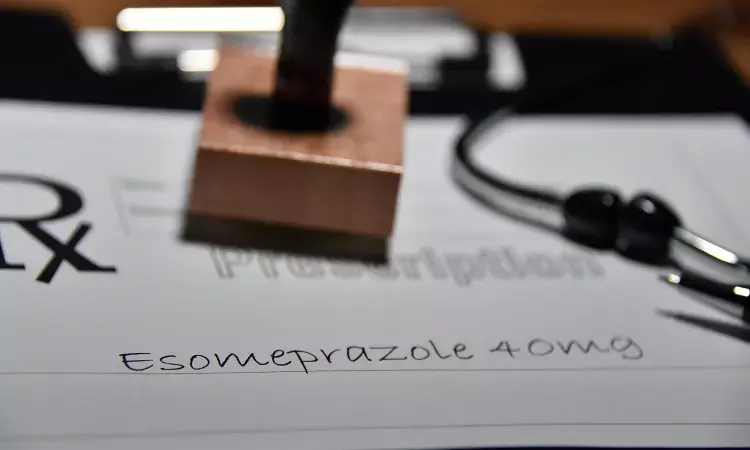- Home
- Medical news & Guidelines
- Anesthesiology
- Cardiology and CTVS
- Critical Care
- Dentistry
- Dermatology
- Diabetes and Endocrinology
- ENT
- Gastroenterology
- Medicine
- Nephrology
- Neurology
- Obstretics-Gynaecology
- Oncology
- Ophthalmology
- Orthopaedics
- Pediatrics-Neonatology
- Psychiatry
- Pulmonology
- Radiology
- Surgery
- Urology
- Laboratory Medicine
- Diet
- Nursing
- Paramedical
- Physiotherapy
- Health news
- Fact Check
- Bone Health Fact Check
- Brain Health Fact Check
- Cancer Related Fact Check
- Child Care Fact Check
- Dental and oral health fact check
- Diabetes and metabolic health fact check
- Diet and Nutrition Fact Check
- Eye and ENT Care Fact Check
- Fitness fact check
- Gut health fact check
- Heart health fact check
- Kidney health fact check
- Medical education fact check
- Men's health fact check
- Respiratory fact check
- Skin and hair care fact check
- Vaccine and Immunization fact check
- Women's health fact check
- AYUSH
- State News
- Andaman and Nicobar Islands
- Andhra Pradesh
- Arunachal Pradesh
- Assam
- Bihar
- Chandigarh
- Chattisgarh
- Dadra and Nagar Haveli
- Daman and Diu
- Delhi
- Goa
- Gujarat
- Haryana
- Himachal Pradesh
- Jammu & Kashmir
- Jharkhand
- Karnataka
- Kerala
- Ladakh
- Lakshadweep
- Madhya Pradesh
- Maharashtra
- Manipur
- Meghalaya
- Mizoram
- Nagaland
- Odisha
- Puducherry
- Punjab
- Rajasthan
- Sikkim
- Tamil Nadu
- Telangana
- Tripura
- Uttar Pradesh
- Uttrakhand
- West Bengal
- Medical Education
- Industry
PPIs use linked to Incident dementia in regular users

According to a population-based cohort study, regular use of proton pump inhibitors is associated with an increased risk of incident dementia; the relationship is more significant in the APOE ε4 genotype.
The study was published in BMC Medicine by the lead author Peidong Zhang from the Department of Epidemiology, School of Public Health, China.
Proton pump inhibitors (PPI) are easily accessible to the public for over-the-counter purchases. They treat peptic ulcers, gastroesophageal reflux disease (GERD), Helicobacter pylori eradication, and NSAID-associated ulcers. PPIs are commonly prescribed for incorrect indications, both in and out of the hospital, for long-term use that does not meet the criteria.
There is increasing attention given to research on the side effect of PPI with its increasing use. Several cohort studies have reported the association of PPI with all-cause dementia. The hazard ratio of PPI users has been calculated as 1.38 to 1.44. Studies are mentioning conflicting conclusions also. There is still uncertainty in the association of PPI with dementia.
Dementia is a progressive impairment in cognitive and independent living functions. The cases are expected to rise to 65.7 million by 2030. Reducing exposure to risk factors is vital in the ray of limited treatment.
The study enrolled 501,002 participants in the age group 40-70 years, including 54.4 % of females from the UK Biobank between 2006 and 2010. Of this, 53,735 constituting 10 %, were regular users of PPIs. The follow-up was done up to 2018 with nine years of median length. The incidence rates were compared for both users and non-users by the Cox proportional hazard model. The participants had no baseline dementia.
The findings from the study include:
- There were a total of 2505 incident cases of all-cause dementia.
- Nine hundred thirty-two cases of Alzheimer's disease (AD) and 524 (VaD) cases of vascular dementia were reported in the total cases.
- Among PPI users, the incident rate of all-cause dementia was 1.06 events per 1000 person-years.
- Among non-users, the rate was 0.51 events per 1000 person-years.
- The Hazard's ratio for PPI users was 1.20 for incident all-cause dementia, 1.23 for incident AD, and 1.32 for VaD, with P values of 0.001, 0.031, and 0.017, respectively.
- A statistically significant interaction was observed in subgroup analysis to verify the association between PPI use and incident all-cause dementia among the APOE ε4 heterozygotes, with HR of 1.46 and P value of 0.048.
- This association was stronger in females for AD, non-smokers, and participants without stroke for VaD with a P value < 0.05
The study concluded that PPI use increases the risk for all-cause dementia, AD, and VaD. The association is more prominent in AOPE ε4 heterozygotes.
The study has extensive results providing valid observations consistent with the previous studies. The high-quality evidence of the study is beneficial in future controlled trials to verify this causal relationship.
Reference:
Zhang, P., Li, Z., Chen, P. et al. Regular proton pump inhibitor use and incident dementia: population-based cohort study. BMC Med 20, 271 (2022)
BDS, MDS in Periodontics and Implantology
Dr. Aditi Yadav is a BDS, MDS in Periodontics and Implantology. She has a clinical experience of 5 years as a laser dental surgeon. She also has a Diploma in clinical research and pharmacovigilance and is a Certified data scientist. She is currently working as a content developer in e-health services. Dr. Yadav has a keen interest in Medical Journalism and is actively involved in Medical Research writing.
Dr Kamal Kant Kohli-MBBS, DTCD- a chest specialist with more than 30 years of practice and a flair for writing clinical articles, Dr Kamal Kant Kohli joined Medical Dialogues as a Chief Editor of Medical News. Besides writing articles, as an editor, he proofreads and verifies all the medical content published on Medical Dialogues including those coming from journals, studies,medical conferences,guidelines etc. Email: drkohli@medicaldialogues.in. Contact no. 011-43720751


